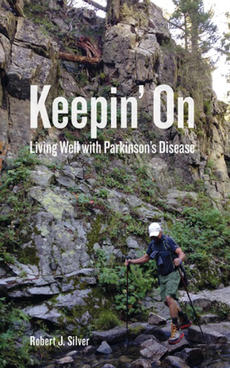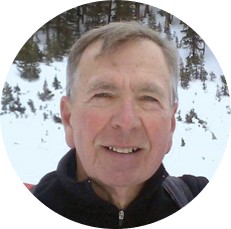
Keepin’ On: Living Well with Parkinson’s Disease (An Excerpt)
Chapter 1: A Tale of Two Bodies
As with all mornings, I’m awake far too early. It’s between 3 and 5 a.m. I’m in the depths of parkinsonian near paralysis. All movement is protracted, slow-motion effort. My balance and coordination are severely compromised. The most minimal motion demands my total concentration and planning. I’ll need a repeated cocktail of medicines just to get through the day.
I inch my way to the edge of our king-size bed. Dianne’s soft, rhythmic breathing confirms that she’s still asleep. I leave the bedside lamp off so as not to wake her. To find my way, I rely on a night-light’s faint glow and on moonlight filtering into our bedroom.
I move my frozen legs beyond the edge of the bed and push myself up to a seated position. My legs hang down toward the tile floor. I feel around for the iPad I’d positioned on the bedside nightstand the previous evening, when I had more control of my body. It’s my link to humanity as I await the return of my ability to move. At this moment, I’m like one of those snakes you see on asphalt roadways, warming their bodies and their cold blood 80 they can move.
Drugs are my asphalt-roadway equivalent. At 5 a.m., I’ll begin a temporary, biochemically based cycle. But for now, I must make my medication-free way across the enormous 15-foot distance to our bathroom.
I’m finally standing next to our bed, clutching the iPad to my chest. I reach out into the darkness with my free arm for support of the chair just beyond the nightstand. I shuffle my bare feet from floor tile to floor tile, feeling each successive grout line. Each marks 13 additional inches of progress toward my goal.
At last, I reach the bathroom doorway. Twisting my body through the opening, I feel around for the door handle and then for the vanity counter. I close the door behind me and switch on the bathroom lights.
The clock on the counter reads 4:39 a.m. Still 21 minutes to the 5 a.m. witching hour, when the magic of modern medicine can begin. I’ll swallow a handful of pills to get moving. Once the medication reaches its full effect, I’ll likely have some two hours of relatively normal movement before I need the next dose. I’ll repeat this three-hour medication cycle over the next 15 hours.
In the lighted bathroom, I keep one hand on the vanity counter as I make my way to the toilet and relief. Pocketing the pill case organized the previous evening, I retrace my steps back through our dark bedroom.
I’m bound for our home’s central living area, some 20 feet away. Steadying myself with a succession of improvised handholds, I inch my way to and through a doorway to the rest of the house. I’m cautious. I don’t want to fall. I swing this door closed behind me and reach for the light switch. I can see again.
It’s now 5 a.m. I must recharge my depleted neurotransmitters. I grasp a waiting water glass, open the pill case, and remove two Stalevos, three Requips, an Azilect, and half an Amantadine tablet. I focus my full attention on the pills to make sure I’ve got the correct combination. I swallow the seven pills in one gulp and reconfirm the time. I’ll still have to wait an hour for the medication to kick in.
I can’t get much serious work done in this state, so I content myself with reading email and watching the morning news on TV. I’m sleep-deprived and impatient as I wait for the medicine to take effect. I hope I don’t need to make another bathroom journey in the interim.
I eye the clock, willing the time to pass and the medicine to work. But time moves excruciatingly slowly. It’s now 5:40. The medicine has probably been at work long enough for me to make my way back to Dianne.
I open our bedroom door, move across the dark room, and climb into bed. The clock radio suddenly fills the air with NPR’s “Morning Edition.” Dianne begins to stir. I edge toward her. We search for a best-fit intertwining of our bodies. I absorb her soft, satisfying warmth pressed against me, shielding her from contact with my cold fingers and toes. My mobility has now returned, but I don’t want to budge. I’m content with the deep, restorative pleasure of holding her in my arms.
After about 15 cherished minutes, I must get going. I dare not linger — the medication’s effectiveness won’t last forever. I bound from our shared bed, now appearing much like a normal person. My gait, balance, and coordination show just slight signs of impairment. Only a trained eye would detect the now-subtle signs of this disease that torments me so.
As the day proceeds, I continue my clock watching juggling my time, meals, and anticipated activity – sometimes appearing impatient to the uninformed. This is the structure of a life lived in three-hour blocks of chemically dependent time.
I sometimes joke about being a walking chemistry experiment. Nevertheless, I’m damned fortunate that the drugs manage my symptoms well, and at I have the resources to obtain them. They allow me to hike, bike, ski, snowshoe, play tennis, sail and even dance. Each Parkinson’s case is different. Most are not as fortunate as I am.
But it’s an odd, if not, bizarre, existence, this yo-yoing back and forth between periods of near immobility and times when I look almost normal. Which body I’ll inhabit in any given instant is always an open question.
Right now, I’m Clark Kent, donning his Superman costume and changing his identity. I’m nearly hyperactive, moving from place to place rapidly and almost gracefully. Since l can’t predict the drugs’ effectiveness from one moment to the next, I feel compelled to pack in all that l can before the inevitable crash. At these times, my drive to do it all is so strong that I may be a bit reckless. Dianne sometimes watches with dread as I move from one recreational activity to another, then to some set of deferred household chores, and finally on to some formal exercise. I grab as much life as possible while I can.
The middle hour of each three-hour period is prime time. It’s when I’m likely to be at my peak physical ability. Since eating protein within an hour of taking one of my primary medicines will block its effectiveness, this golden middle hour is the one time I can eat whatever I damn well please. Most people don’t live their lives on my rigid meal and medicine schedule, so it complicates plans with friends. I try to alter my medication routine, covertly maneuvering around the course of a shared meal, if possible, to prevent this intrusive fact of my life from invading the lives of those around me. Parkinson’s so pervades my consciousness that I do all I can to thwart its further encroachment.
Sometimes I kid myself into thinking these periods of more normal balance won’t come to a crashing halt. I may even forget a dose. If I do, I’m painfully reminded that potent drugs rule my life. My rude reawakening to this reality is striking. Suddenly, it’s back! The paralyzing cloak of symptoms descends.
Even when I do stick to a rigid routine of medication, meals, and activity, sometimes the medication just fails to act as I hope it will. In any instant, I’m uncertain what I’ll be able to do and how well I’ll be able to do it.
On this day, I’m out alone on the golf course. None of my buddies are available, and I’m not averse to a solitary outing. I’ll just hit two balls for each hole, as if I had a companion. It’s a bright, sunny day, late in the fall golfing season. The majestic mountains rimming our high-desert valley home shimmer in the area’s legendary light. The crisp, cool breeze on my face hints at the coming season. I feel alive, invigorated, and amazed to play this game that requires some balance and coordination. When I golf with friends who know I have Parkinson’s disease, I secretly smile at their surprise when I tee off. I often hit the ball farther and straighter than they would ever have expected.
So, golf bag over my shoulder, I’m walking the course. I’ve attended to the details of my food and medication schedule. Then, without warning, I feel a vague sense of compromised coordination in my left leg. It’s beginning to drag. I must concentrate on it to lift it and move it forward.
Oh, shit! Not now! Not here!
I’ve still got four holes to go, and my medicine has stopped working. With each step, I remind myself how to walk. Every step is an ordeal. There’s nobody around, and I’ve got to get through the rest of the course.
Surprisingly and for reasons unknown, I’m sometimes able to walk better backward than forward. So, there I am, alone in the middle of this vast open space, carrying my golf clubs, glancing back over my shoulder from time to time, all while walking in reverse.
As I make my way to the clubhouse and to my parked car, frustration and disappointment swallow whole my afternoon joy and exuberance. I have rapidly descended from a pinnacle of pleasure to a depth of despair. Later, over dinner with Dianne my sense of humor starts to digest and metabolize this way of golf. Though painful in the moment, I will transform it into one of my favored funny stories.
By the end of the day, I’ve come full circle. I’m emotionally and physically depleted. As I get into bed, I sense the medication wearing off. Without drugs, my mobility will continue to diminish until morning, when the cycle begins again. I use what ability I still possess to arrange my morning pills.
Lights out, I feel around for Dianne. As if in some slapstick comedy, I must first free my arm – the one I’ve managed to pin beneath the weight of my own body. Gone are the days of a reliable body’s graceful overture. As Dianne moves to meet my labored effort, I yearn both for her and for sleep. I’ll likely be awake again in some five hours.
As I drift off to sleep, a fierce; unseen war rages within me. With the coming dawn, I wonder, which of the two distinct bodies that vie for dominion will be mine? In any given day, hour, minute, second, I don’t know which body will prevail. Will it be the one of paralysis or one of movement? The body of my dreams or the body of my nightmares?
Reprinted with the permission of the author.

